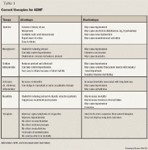- Safety & Recalls
- Regulatory Updates
- Drug Coverage
- COPD
- Cardiovascular
- Obstetrics-Gynecology & Women's Health
- Ophthalmology
- Clinical Pharmacology
- Pediatrics
- Urology
- Pharmacy
- Idiopathic Pulmonary Fibrosis
- Diabetes and Endocrinology
- Allergy, Immunology, and ENT
- Musculoskeletal/Rheumatology
- Respiratory
- Psychiatry and Behavioral Health
- Dermatology
- Oncology
Tolvaptan: A novel oral vasopressin V2 receptor antagonist for the treatment of acute decompensated heart failure and hyponatremia
Tolvaptan is an oral selective vasopressin V2 receptor antagonist that works to produce aquaresis (water diuresis without electrolyte excretion) by blocking the effects of AVP. This effect makes tolvaptan a viable treatment option for patients with acute decompensated heart failure (ADHF) and hyponatremia.

Key Points
Abstract
Arginine vasopressin (AVP) is a nonapeptide hormone responsible for mediating serum sodium and serum osmolality by increasing water retention in the kidney. Tolvaptan is an oral selective vasopressin V2 receptor antagonist that works to produce aquaresis (water diuresis without electrolyte excretion) by blocking the effects of AVP. This effect makes tolvaptan a viable treatment option for patients with acute decompensated heart failure (ADHF) and hyponatremia. Current studies of tolvaptan in patients with ADHF indicate that this agent is safe and effective in relieving the signs and symptoms of this condition without affecting mortality. Data from these trials also indicate that tolvaptan does not adversely affect renal function, blood pressure, or serum potassium in this patient population. This inert effect on mortality, renal function, and electrolytes sets tolvaptan apart from other therapies for heart failure, which are known to deleteriously affect these parameters. Tolvaptan has also been demonstrated to be effective in correcting hyponatremia in patients with heart failure, cirrhosis, or syndrome of inappropriate antidiuretic hormone. Tolvaptan is also being studied for the treatment of autosomal dominant polycystic kidney disease. In December 2007, FDA accepted an NDA for tolvaptan for the treatment of ADHF and hyponatremia. If approved, tolvaptan will be a new option for patients with these conditions. (Formulary. 2008;43:236–249.)
Heart failure is a syndrome that is associated with a substantial clinical and economic burden on the US population. Approximately 5 million patients in the US have heart failure, and approximately 550,000 new cases are diagnosed each year.1 In 2008, Americans are expected to spend almost $34.8 billion to treat patients with heart failure. The majority of these costs (approximately two-thirds) are attributable to the management of episodes of acute decompensated heart failure (ADHF) (eg, hospitalization).2

Arginine vasopressin (AVP) is a nonapeptide hormone synthesized in the hypothalamus and stored in the posterior pituitary. AVP predominately mediates serum sodium and serum osmolality by increasing water retention in the kidney (antidiuresis).6 Elevated levels of AVP are present in patients with ADHF and contribute to the fluid retention and hyponatremia often observed in these patients.7 A drug that mitigates the effects of AVP by antagonizing vasopressin receptors could potentially relieve symptoms and improve outcomes in patients with heart failure. Tolvaptan (Otsuka America Pharmaceuticals) is the second drug to be developed in the class of vasopressin antagonists. In December 2007, FDA accepted an NDA for tolvaptan for the treatment of ADHF and hyponatremia; the drug is currently pending approval for these indications. Tolvaptan is also currently being studied for the treatment of autosomal dominant polycystic kidney disease (ADPKD).
FDA Approves Combination Therapy for Pulmonary Arterial Hypertension
March 25th 2024J&J’s Opsynvi is single-tablet combination of macitentan, an endothelin receptor antagonist, and tadalafil, a PDE5 inhibitor. It will be priced on parity with Opsumit, which is also a J&J product to treat patients with PAH.
FDA Issues Complete Response Letter for Onpattro in Heart Failure Indication
October 9th 2023Alnylam Pharmaceuticals will no longer pursue this indication of Onpattro and will instead on focus on a label expansion for Amvuttra, which is in phase 3 development to treat patients with cardiomyopathy of ATTR amyloidosis.
